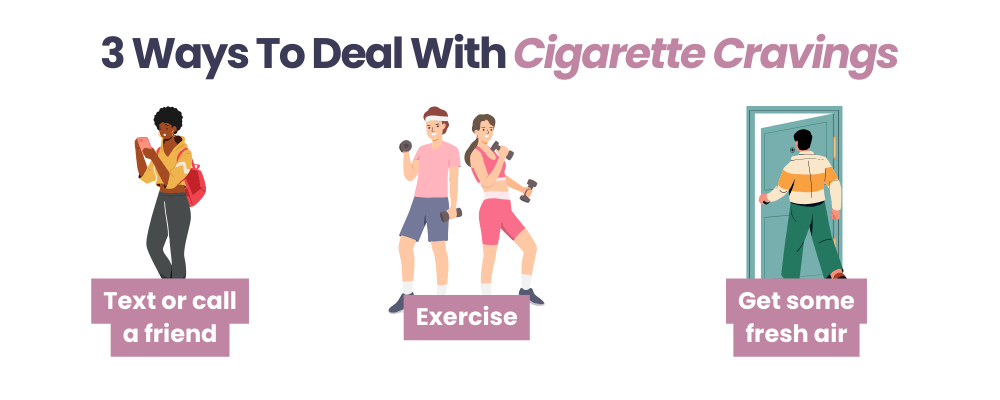Zyban vs Other Quit Smoking Aids: Which is Best?
Table of Contents
Written by: Sunny Dhain MPharmRS PgDip IndP
Date reviewed: 26/12/2023
Introduction
Quitting smoking is a journey fraught with challenges, b
ut the right aid can make a significant difference. Among the plethora of smoking cessation aids available, Zyban stands out. This article aims to explore how Zyban compares with other quit smoking aids and why it might be your best choice.
Understanding quit smoking aids
There are numerous aids to help smokers quit, including nicotine patches, gums, and various medications. Each has its unique mechanism of action, but the ultimate goal remains the same: helping you q
uit smoking for good. The key is to find an aid that aligns with your needs and preferences.
Zyban – an overview
Zyban, with its active ingredient bupropion, functions differently from typical nicotine replacement therapies. It works on a neurological level to reduce cravings and withdrawal symptoms. Studies have shown Zyban to be remarkably effective in helping individuals quit smoking, especially when combined with a comprehensive smoking cessation program.
How to buy Zyban online
You can conveniently purchase Zyban online at The Family Chemist you can purchase online now. This ease of access makes it a practical option for many looking to quit smoking.
Zyban vs other quit-smoking aids
Introduction to quit smoking aids
Quitting smoking is an arduous journey, and finding the right cessation aid is crucial to success. While there are several aids available, including nicotine patches, gums, lozenges, and prescription medications, Zyban has emerged as a distinctive choice. This section delves deeper into how Zyban stacks up against these alternatives.
Mechanism of action
- Nicotine Replacement Therapies (NRTs): Products like patches, gums, and lozenges work by supplying controlled amounts of nicotine to ease withdrawal symptoms and cravings, thereby helping to wean smokers off their dependency.
- Zyban (Bupropion): Unlike NRTs, Zyban doesn’t contain nicotine. Instead, it alters neurochemical activity in the brain, particularly affecting dopamine and norepinephrine levels, which helps to reduce cravings and withdrawal symptoms.
Effectiveness
- NRTs: Studies suggest that NRTs can double a smoker’s chances of quitting successfully. They are particularly effective when combined with behavioral support.
- Zyban: Clinical trials have shown that Zyban can be more effective than NRTs in certain populations. Its unique mechanism of action offers an alternative for those who may not respond well to NRTs.
Ease of use
- NRTs: These products are generally easy to use but require frequent dosing throughout the day (gums/lozenges) or wearing a patch for 16-24 hours.
- Zyban: Taken orally in pill form, Zyban is typically dosed twice a day. It is often considered more convenient for people who prefer not to use topical or oral NRTs.
Side effects and considerations
- NRTs: Common side effects include skin irritation (patches), mouth irritation, hiccups, and nausea (gums/lozenges). They are generally safe but can be misused.
- Zyban: Side effects may include dry mouth, insomnia, and in rare cases, seizures. Zyban is not suitable for individuals with certain medical conditions or those taking specific medications.
Cost comparison
- NRTs: The cost can vary, but over-the-counter NRTs can be more budget-friendly compared to prescription medications.
- Zyban: As a prescription medication, Zyban might be more expensive than over-the-counter NRTs, but insurance coverage could reduce out-of-pocket costs.
Patient preference and suitability
- Individual needs: The choice between Zyban and other aids often depends on individual preferences, medical history, and specific smoking habits.
- Healthcare guidance: It’s crucial for smokers to consult healthcare professionals to choose the most suitable aid. This decision should be based on a comprehensive evaluation of their health status, smoking history, and previous quit attempts.
Conclusion
In summary, while NRTs provide a nicotine-based approach to quitting, Zyban offers a non-nicotine alternative that may be more suitable for certain smokers. Its unique mechanism, effectiveness, and ease of use make it a strong contender in smoking cessation.
Comparing Zyban with Champix
Introduction to Champix
Champix (known as Chantix in the U.S.), like Zyban, is a prescription medication used in smoking cessation. While both are effective aids, their mechanisms of action, side effects, and usage protocols differ significantly. This section provides a detailed comparison of Zyban and Champix.
Mechanism of action
- Zyban (Bupropion): Zyban works by affecting neurotransmitters in the brain, mainly dopamine and norepinephrine. This alteration helps reduce cravings and withdrawal symptoms associated with quitting smoking.
- Champix (Varenicline): Champix works by binding to nicotine receptors in the brain. It simultaneously reduces cravings (by partially stimulating these receptors) and lessens the pleasure derived from smoking (by blocking nicotine from attaching to these receptors).
Effectiveness
- Zyban: Studies have indicated that Zyban is effective in helping smokers quit, especially when combined with counseling or support programs.
- Champix: Clinical trials have often shown Champix to be more effective than Zyban in helping smokers quit. However, individual responses can vary greatly.
Dosage and treatment regimen
- Zyban: Typically prescribed for 7-12 weeks, Zyban is usually started one to two weeks before the quit date. It involves taking one to two pills per day.
- Champix: Champix requires a more extended treatment period, usually 12 weeks. The dosage is gradually increased over the first week, and it involves taking one to two pills per day.
Side effects
- Zyban: Common side effects include insomnia, dry mouth, and in rare cases, seizures. It’s not recommended for individuals with a history of seizures or severe head trauma.
- Champix: The most common side effects of Champix are nausea, sleep disturbances, headaches, and, in some cases, changes in mood and behavior.
Cost and accessibility
- Zyban: The cost of Zyban can vary, and it may be covered by health insurance or prescription plans.
- Champix: Generally, Champix is more expensive than Zyban, but insurance coverage can significantly reduce the cost for the patient.
Patient suitability and preferences
- Health Conditions: Champix is not recommended for people with certain psychiatric conditions due to its potential psychological side effects.
- Effectiveness vs. Side Effects: The choice between Zyban and Champix often comes down to balancing effectiveness with potential side effects.
Why choose Zyban?
The advantages of Zyban are clear. It’s not just another nicotine replacement; it’s a treatment that helps alter the smoker’s response to withdrawal. Health professionals often recommend Zyban due to its efficacy and the positive outcomes observed in patients.
Conclusion
In this comprehensive exploration of smoking cessation aids, we’ve delved into the intricacies of both nicotine-based and non-nicotine alternatives, highlighting Zyban’s unique place in this landscape. Zyban, with its distinctive non-nicotine approach and neurochemical impact, stands out for its effectiveness, convenience, and suitability for a variety of smokers. Its comparison with other aids like NRTs and Champix reveals its strengths and potential as a preferred choice for those embarking on their quit-smoking journey.
For those seeking a convenient and effective way to quit smoking, Zyban emerges as a promising option. Its proven efficacy, ease of use, and non-nicotine mechanism make it a strong contender, especially for those who haven’t found success with traditional nicotine replacement therapies. Remember, the journey to quit smoking is deeply personal, and the choice of aid should align with your individual needs and health considerations.
Ready to take the next step towards a smoke-free life? Consider Zyban as your ally in this challenging yet rewarding journey. Visit The Family Chemist here to learn more and purchase Zyban at an affordable price. Embrace the opportunity to embark on a healthier, smoke-free future with Zyban today.
FAQs
1. What are the success rates of Zyban?
Zyban, also known as bupropion, is a medication primarily used to help people quit smoking. Its success rates vary based on individual circumstances, but studies generally show that Zyban can significantly increase the chances of quitting smoking when compared to no treatment. The success rate also improves when Zyban is used in combination with counseling or support groups. It’s important to note that individual results may vary, and it’s recommended to consult a healthcare professional for personalized advice.
2. How long does it take for Zyban to kick in?
The onset of Zyban’s effects can differ from person to person. Typically, it may take several weeks to feel the full benefits of Zyban. Healthcare providers often recommend starting the medication 1-2 weeks before the planned quit date to allow it to build up in the system. Patients are usually advised to continue taking Zyban for several weeks or months, depending on their individual response.
3. Does Zyban stop you smoking?
Zyban is designed to help reduce the urge to smoke and alleviate withdrawal symptoms associated with quitting smoking. While it does not stop smoking instantly, it aids in making the process more manageable. Zyban is most effective when used as part of a comprehensive quit-smoking program that may include counselling, support groups, and a strong commitment to quitting.
4. How does Zyban make you feel?
Zyban can affect individuals differently. Commonly reported feelings include reduced cravings for cigarettes and decreased withdrawal symptoms, which can make quitting smoking easier. Some people may experience side effects like dry mouth, insomnia, or changes in appetite.
5. Do you gain weight on Zyban?
Weight changes can be a concern when quitting smoking. Zyban has been reported to help reduce weight gain typically associated with smoking cessation in some individuals. However, responses vary, and some people might experience weight gain or loss while on the medication.


